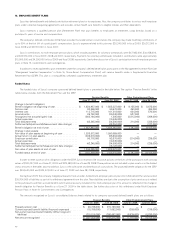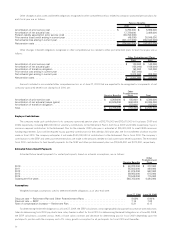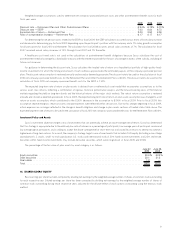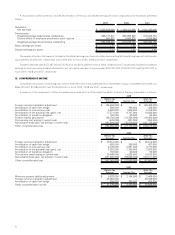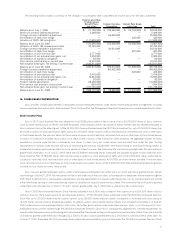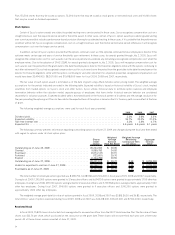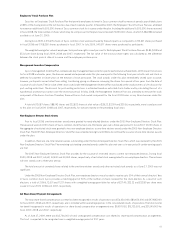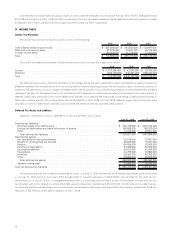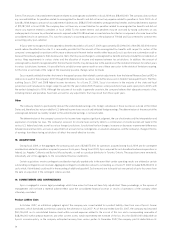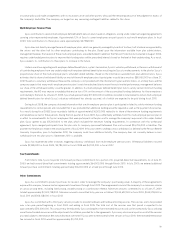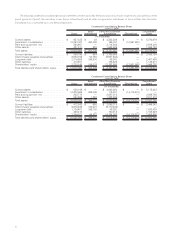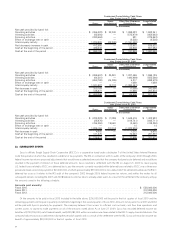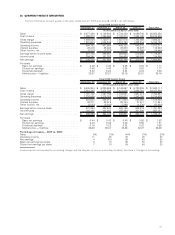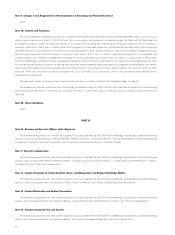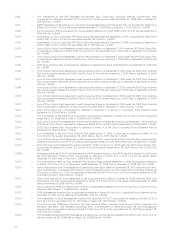Sysco 2009 Annual Report Download - page 78
Download and view the complete annual report
Please find page 78 of the 2009 Sysco annual report below. You can navigate through the pages in the report by either clicking on the pages listed below, or by using the keyword search tool below to find specific information within the annual report.Events.The amount of recorded interest expense related to unrecognized tax benefits in fiscal 2009 was $18,693,000. The company does not have
any accrued liabilities for penalties related to unrecognized tax benefits and did not record any expense related to penalties in fiscal 2009. As of
June 28, 2008, the gross amount of accrued interest liabilities was $138,207,000 related to unrecognized tax benefits and recorded interest expense
of $12,287,000 in fiscal 2008. The company does not have any accrued liabilities for penalties related to unrecognized tax benefits and did not
record any expense related to penalties in fiscal 2008. To the extent interest and penalties may be assessed by taxing authorities on any
underpayment of income tax, estimated amounts required under FIN 48 have been accrued and are classified as a component of income taxes in the
consolidated results of operations. This was the company’s accounting policy prior to the adoption of FIN 48, and Sysco elected to continue this
accounting policy post-adoption.
If Sysco were to recognize all unrecognized tax benefits recorded as of June 27, 2009, approximately $54,096,000 of the $92,145,000 reserve
would reduce the effective tax rate. It is reasonably possible that the amount of the unrecognized tax benefits with respect to certain of the
company’s unrecognized tax positions will increase or decrease in the next twelve months either because Sysco’s positions are sustained on audit or
because the company agrees to their disallowance. Items that may cause changes to unrecognized tax benefits primarily include the consideration of
various filing requirements in various states and the allocation of income and expense between tax jurisdictions. In addition, the amount of
unrecognized tax benefits recognized within the next twelve months may decrease due to the expiration of the statute of limitations for certain years
in various jurisdictions; however, it is possible that a jurisdiction may open an audit on one of these years prior to the statute of limitations expiring.
At this time, an estimate of the range of the reasonably possible change cannot be made.
Sysco recently settled all matters that were in the appeals process that related to certain adjustments from the Internal Revenue Service (IRS) in
relation to its audit of the company’s 2003 through 2006 federal income tax returns. See further discussion in Note 22, Subsequent Events.The IRS is
auditing Sysco’s 2007 and 2008 federal income tax returns. As of June 27, 2009, Sysco’s tax returns in the majority of the state and local
jurisdictions and Canada are no longer subject to audit for the years before 2005. However, some jurisdictions have audits open prior to 2005, with
the earliest dating back to 1996. Although the outcome of tax audits is generally uncertain, the company believes that adequate amounts of tax,
including interest and penalties, have been accrued for any adjustments that may result from those open years.
Other
The company intends to permanently reinvest the undistributed earnings of its foreign subsidiaries in those businesses outside of the United
States and, therefore, has not provided for U.S. deferred income taxes on such undistributed foreign earnings. The determination of the amount of the
unrecognized deferred tax liability related to the undistributed earnings is not practicable.
The determination of the company’s provision for income taxes requires significant judgment, the use of estimates and the interpretation and
application of complex tax laws. The company’s provision for income taxes primarily reflects a combination of income earned and taxed in the
various U.S. federal and state, as well as various foreign jurisdictions. Jurisdictional tax law changes, increases or decreases in permanent differences
between book and tax items, accruals or adjustments of accruals for tax contingencies or valuation allowances, and the company’s change in the mix
of earnings from these taxing jurisdictions all affect the overall effective tax rate.
18. ACQUISITIONS
During fiscal 2009, in the aggregate, the company paid cash of $218,075,000 for operations acquired during fiscal 2009 and for contingent
consideration related to operations acquired in previous fiscal years. During fiscal 2009, Sysco acquired for cash broadline foodservice operations in
Ireland, Los Angeles, California and Boston, Massachusetts, as well as a produce distributor in Toronto, Ontario. The acquisitions were immaterial,
individually and in the aggregate, to the consolidated financial statements.
Certain acquisitions involve contingent consideration typically payable only in the event that certain operating results are attained or certain
outstanding contingencies are resolved. Aggregate contingent consideration amounts outstanding as of June 27, 2009 included $78,250,000 in
cash, which, if distributed, could result in the recording of additional goodwill. Such amounts are to be paid out over periods of up to four years from
the date of acquisition if the contingent criteria are met.
19. COMMITMENTS AND CONTINGENCIES
Sysco is engaged in various legal proceedings which have arisen but have not been fully adjudicated. These proceedings, in the opinion of
management, will not have a material adverse effect upon the consolidated financial position or results of operations of the company when
ultimately concluded.
Product Liability Claim
In October 2007, an arbitration judgment against the company was issued related to a product liability claim from one of Sysco’s former
customers, which formalized a preliminary award by the arbitrator in July 2007. As of the year ended June 30, 2007, the company had recorded
$50,296,000 on its consolidated balance sheet within accrued expenses related to the accrual of this loss and a corresponding receivable of
$48,296,000 within prepaid expenses and other current assets, which represented the estimate of the loss less the $2,000,000 deductible on
Sysco’s insurance policy, as the company anticipated recovery from various parties. In December 2007, the company paid its deductible on its
58


